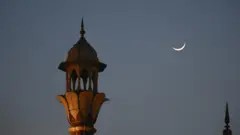Ramadan is a significant month in the Islamic calendar observed by Muslims worldwide as a period of fasting, prayer, reflection, and community. A common question for those unfamiliar with Ramadan, or even for Muslims themselves as the dates shift annually, is: How Long Does Ramadan Last? Understanding the duration of Ramadan involves understanding the Islamic lunar calendar and the practices that determine its beginning and end.
What is Ramadan and Why Does its Timing Vary?
Ramadan is the ninth month of the Islamic calendar, a lunar calendar system. This calendar differs from the Gregorian solar calendar used in many parts of the world. The Islamic calendar is based on the cycles of the moon, with each month beginning with the sighting of a new crescent moon. Because lunar months are slightly shorter than solar months, the Islamic calendar shifts by approximately 11 days each year in relation to the Gregorian calendar. This is why Ramadan does not occur at the same time each year and its timing varies across seasons over time.
 Crescent moon seen over the closed Grand Mosque of Delhi Jama Masjid during Ramadan in 2020.
Crescent moon seen over the closed Grand Mosque of Delhi Jama Masjid during Ramadan in 2020.
Determining the Length of Ramadan
The length of Ramadan is intrinsically linked to the lunar cycle. Each month in the Islamic calendar, including Ramadan, lasts either 29 or 30 days, depending on the sighting of the new moon. Ramadan commences with the sighting of the new crescent moon that marks the beginning of the ninth month. Similarly, Ramadan concludes and the subsequent month, Shawwal, begins with the sighting of the new crescent moon at the end of the 29th or 30th day.
Therefore, Ramadan can last for either 29 or 30 days. The actual duration is not predetermined but is confirmed based on the lunar sighting each year. Historically, the sighting of the new moon relied on visual observation. However, in modern times, astronomical calculations are also used to predict the new moon, though the actual commencement of Ramadan and Eid al-Fitr often still relies on official moon sighting announcements from religious authorities, particularly in Saudi Arabia.
Ramadan 2024: An Example of Duration
In the year 2024, as mentioned in the original report, Ramadan lasted for 30 days. Fasting began on Monday, March 11th, and concluded on Wednesday, April 10th. This example illustrates a Ramadan that spanned the maximum possible duration of 30 days. It provides a concrete instance of how long Ramadan can last in a given year.
Factors Influencing Ramadan’s Duration: Lunar Cycle and Moon Sighting
The primary factor determining how long Ramadan lasts is the lunar cycle. A complete lunar cycle, from new moon to new moon, is approximately 29.5 days. This is why Islamic months alternate between 29 and 30 days to roughly align with the lunar cycle.
The actual sighting of the new moon is the practical determinant. If the new moon is sighted on the 29th evening of Sha’ban (the month preceding Ramadan), then Ramadan begins the next day and will likely last 29 days. If the new moon is not sighted on the 29th evening, then Sha’ban completes 30 days, and Ramadan begins on the evening following the 30th day, potentially lasting for 30 days. Cloudy conditions or geographical location can also influence moon sighting, sometimes leading to slight variations in the start and end dates in different regions, although unified calendars are becoming increasingly common.
Eid al-Fitr: Celebrating the End of Ramadan
The end of Ramadan is marked by the festival of Eid al-Fitr, often translated as “the festival of breaking the fast.” Eid al-Fitr is celebrated immediately after Ramadan concludes, upon the sighting of the new moon that marks the beginning of Shawwal. This joyous occasion signifies the completion of the month of fasting and is celebrated with prayers, family gatherings, feasts, and charitable giving.
In conclusion, Ramadan’s duration is not fixed to a specific number of days in the Gregorian calendar but rather depends on the lunar cycle and the sighting of the new moon. It typically lasts for 29 or 30 days, making it a month-long observance of fasting, prayer, and spiritual reflection for Muslims worldwide, culminating in the celebratory festival of Eid al-Fitr.